- Home
- William Styron
A Tidewater Morning Page 7
A Tidewater Morning Read online
Page 7
There were a couple of Quigley offspring, a boy and a girl, but I had never seen them; they were considerably older than I and had already dropped out of high school. But nearly always present was Mrs. Quigley, a tough old graying slattern who chain-smoked corktipped Raleigh cigarettes and slapped around in bedroom slippers with red feather pompons as she served beer and pigs’ feet and tried to cheer up the disconsolate rednecks. Sometimes she wore hair curlers all day long. Her jokes were dirty and they made me cringe a little, while I listened with one ear and folded my newspapers. I wasn’t really a prude, since I had recently passed from the relative purity of grammar school into high school, where the common lingo swarmed with obscenities. Yet Mrs. Quigley was almost the first adult and certainly the only woman I knew out of whose mouth flowed, with the liquid ease of ordinary discourse, a stream of four-letter words. “Hey, Brighteyes,” she’d say to one of the sadder beer guzzlers, “let go of your dick and have another Schlitz.” I was torn between shock and enchantment, but often my giggles prevailed, since her slovenly good cheer was an antidote to her husband’s ill nature; more than once she slipped me a Mounds bar or a tepid ginger ale. In the end she was the only colorful spot in these dismal afternoons and Sunday mornings, and I may even have developed, before my labors ended, a distant crush, finding irresistible the way she belched, loud and with blowsy relish, or the moment when she raised her rayon shift and displayed to the gaping Carolinians a heavy blue-veined thigh tattooed with a fading red poinsettia.
Then there was Ralph, the store drudge. He pushed boxes around and did the heavy lifting in the back room and cleaned up the tables after the customers left. Ralph worked long hours, but I figured he was paid not much more than our newsboys’ coolie wages. Whatever he was paid, Mr. Quigley prized him for the sport he provided, this dim-witted Negro, ginger-colored and freckled, pear-shaped with a slue-footed waddle and a high, fluting voice like a castrato’s . His trouble was, I suspect, glandular, but Mr. Quigley exploited it as a sideshow attraction for the group gathered around the steel-topped tables; Ralph complied, in fact cooperated, as many a black man—some much brighter than Ralph—did in that era, when it was smarter to be Stepin Fetchit or Rochester than a smartass. “Ralph,” he would say, “did you know that you are about the weirdest-goddamned-sounding Knee-grow there is?” “Yassah,” Ralph would pipe. Then, hurt: “Nawsuh.”
Then “Yassah” again, with a grin frozen in a desire to please. “You sound like a goddamned dickeybird.” “Yassah.” “Or a tree toad.” “Yassah.” I lived in a racist society and had been inoculated so early against the idea of equality that a part of me supinely went along with the prevailing view that Negroes were a lesser breed of human being. But parental enlightenment and my own conscience—I would like to think it was no more complicated than Huck Finn’s—caused me to know otherwise. My skin crawled at Mr. Quigley’s loutish treatment of Ralph; it troubled me only slightly more than Ralph’s tame, grinning submission. “Ralph,” he would announce in an aside to the customers, “is the world’s goosiest burrhead.” A low hum from the group, and a single cackle. “I'm gone show you all something truly amazing.” The routine was set up, craftily prepared, Ralph feigning unconcern as he swabbed at a table, the fat behind in baggy trousers presenting itself amid the smoke, swaying. Mr. Quigley (this grown man, I would think while I watched) would sneak up on Ralph through the crowd, his pinched dark face creased with delight, anticipating. And then the sudden pounce, the goose in the rear, and Ralph, floundering upward with clumsy, exaggerated panic, arms flailing, the voice a falsetto wail. “Oh, Lawd, Lawd, ooooeeee!” Howls from the crowd, thumping bottles, general pleasure and gratitude. And Ralph would waddle around a bit, beaming in the shower of applause, and lick his lips in absurd self-approval. After these performances, sometimes Mr.
Quigley would give Ralph a soft drink or a candy bar, which, I always reflected, was more than he ever gave me. I'd hoist my bag to my shoulder and head out into the clammy heat, thinking, The dumb black son of a bitch, how can he take that? Then the fact of the misfortune of his color would crowd in on me, and my contempt for Ralph would be replaced by my loathing for Mr. Quigley and his grossness, his niggardly heart.
In the early morning hours of a September Sunday, I lay in bed listening to the sounds of my mother’s suffering. It was a few days before her fifty-first birthday. For the eight years she had endured the cancer the pain had sometimes been severe, but it had usually been of the sort that with immense struggle she could bear; now in these final weeks her strength had drained away. Creeping through her bones, the pain had become insistent, nearly without letup. I awoke at about one, aroused by her quavering cry in the front room. Then the tiptoeing feet of the nurse, Miss Slocum, followed by the heavier footsteps of my father. In my mother’s room Miss Slocum made soft, sibilant sounds, indistinct; my father’s voice, a tone louder, began to come intermittently in words that were distraught and tortured. That evening an announcement on the radio downstairs had spoken of a heat wave, a record for the season; I lay soaked in sweat beneath a black electric fan, which in each halfcircle of its rotation allowed the heat to engulf me, then cooled me with a puny puff of air. From the dense darkness outside my window, where, I knew, fireflies winked among my mother’s two small flower beds, I inhaled a sugary odor of late-blooming clematis. Other Septembers the white cascading vine had smelled delicious; now in the night it made me feel a little sick. Again I heard Miss Slocum’s whispery syllables of comfort, touched with strain.
Suddenly my mother screamed—a scream, long and hopeless, containing a note of anguish like nothing I had ever heard before. It was a shriek that swept up and down my naked body like a flame. It was an alien sound, which is to say unexpectedly beyond my sense of logic and my experience, so that for the barest instant it had the effect of something histrionic, out of the movies, a Frankenstein-Dracula film in which a bad actress emoted implausible terror. But it was real, and I plunged my face into my pillow, wrapping it about my head like a humid caul. I tried to shut out the scream. Deaf, in darkness, I sought to think of anything but that scream. I thought of Miss Slocum, who was a buxom woman of about thirty with an open, dimpled, heartlike face scrubbed mirror-bright; she resembled a fattened earthbound Sonja Henie and possessed an arresting defect: vestigial thumbs that were attached to the outside of her normal thumbs. This is a grotesquerie that I almost wish I didn’t have to record. But it is an actual part of a complex remembrance. There had been a touch of dark mirth in my mother’s desire, six months before, to fire Miss Slocum as soon as she had been hired, when the extra thumbs were suddenly perceived; becoming daily more helpless, my mother required bathing and massage, and she had professed abhorrence at the idea of twelve digits stroking her flesh. Why, in God’s name, she asked my father, hadn’t she had them removed? She was especially repelled when she noticed that Miss Slocum kept the little thumbs manicured, but I heard my father explain that this was not unreasonable, really; wouldn’t neglected thumbs be more attention-getting, and so forth. Anyway, the matter was resolved—besides, the nurse was a treasure, utterly patient and gentle. When I unwrapped my head from the pillow, the screaming had stopped.
“Miss Slocum, you must give her more morphine,” I heard my father’s voice, hoarse, nearer, outside my door.
“I cain’t, Mr. Whitehurst, I just cain’t,” came the reply. She spoke in the accents of the Virginia hill country, a throaty, soft treble from the steep slopes and hollow, which, although I never really knew or asked about her upbringing, always made me think of an amiably disheveled Li’l Abner family—half a dozen towheaded brothers and sisters, a moonshiner father, a mother whose lip bulged with a tuck of snuff. I had become fond of her simple, countrified tenderness, the artless compassion that she lavished on my mother day after hot summer day, bathing her, changing her, trying to soothe her remediless misery. “I just cain’t give her any more morphine. Dr. Beecroft won’t allow it. He gave me instructions. I cain’t give her any
more just now.”
“You must give her more. I can’t stand what she’s having to bear.”
“I cain’t, Mr. Whitehurst,” she insisted patiently. “You must understand that. Please believe me. There is a certain dose—there is—and you mustn’t go beyond that.”
“It’s past endurance, that pain!” His voice rose, at the edge of breaking. “She’s going mad!”
“Dr. Beecroft will be here soon, Mr. Whitehurst,” she replied. “You must please talk to him. I’m sure he’s going to do what he can.” I heard their footsteps as they moved back toward my mother’s bedroom.
In the half-light my eyes roamed around my room, a cramped space, the room of an only child, tidy, organized, with the possessory feel of everything in place, unmolested by any of the brothers and sisters I had for years longed to have and now, in my desolation, longed for with a special ache. The village had many children. It was a place and an era of busy procreation. The houses of the village, small-scale as they appeared, were swollen with vigorous, rowdy families, and my friends all had siblings I envied for the very fact of their being—splendid older brothers, sensible younger sisters; even the little runny-nosed brats at the bottom of the family chain I would have loved to cuddle and protect. Once when a neighbor daughter was killed in a horse-riding fall, I saw the overspilling fountain of love and solace that welled up from the heart of the family, brothers and sisters embracing and hugging, clinging to each other, as if their grief were lessened by simple contact with their common origin of flesh. And for some nights they slept sprawled together in one big bed, holding on to one another, preventing even sleep from separating them in their mourning. In my room I felt as alone as if I were in a dungeon. The heat was malign, smothering, and I gasped like a fish in the darkness. The crack from the door sent a wedge of light against the wall above me with its heroic frieze: the Fordham backfield in Kodachrome. And the edge of my bookshelf, the light bisecting Mr. Midshipman Easy, The Swiss Family Robinson, Les Misérables, Ferdinand, volumes one through four of The Book of Knowledge. “Gently, gently,” I heard my father say, “oh, please gently, Miss Slocum.” And at the light’s dimmest reach: FIRST PRIZE, ORAL READING, TIDEWATER REGION, VIRGINIA PUBLIC SCHOOLS. Laurie Macauley had died of a broken neck. No one knew why the mare had bolted; she had been seraphically gentle, a paragon of equine docility. But Laurie and the horse had remained lost in the woods near the C & O tracks for a day and a night, and when they discovered the body, part of her face had been eaten away by vermin, preventing the open-coffin viewing that would have been customary. I squirmed on the wet sheets, thinking: I don’t understand this. I felt thirsty—an urgent, serious thirst of the kind that seized me after my newspaper route. I got up from bed and slipped on my pajama bottom, opened the door just wide enough so that I could slide through, and then slipped downstairs on tiptoeing bare feet so that my father and Miss Slocum wouldn’t hear me. The kitchen, like the other rooms of the house, was skimpy and confined; I darted over the ripples of the linoleum floor in three steps, opened the refrigerator, and groped in the dark interior for the jar of ice water. Then I lifted the jar and gulped, my eyes moistening over in appreciation even as I sensed a twitch of guilt. I knew I shouldn’t be drinking from the jar. One didn’t swap germs promiscuously at a time when common infections sometimes spelled doom. Surfaces were wiped clean, made sterile; raw food was triply rinsed and purified. As people moved through an invisible blizzard of evil microbes, there was much random mortality. Mr. Max Weissberger, owner of the leading department store in the town nearby, scratched a pimple on his nose on a Thursday, and by Monday he was dead. On the main floor at the store, near the perfume counter and on the wall between the elevators, a portrait plaque in bronze memorializing Max Weissberger always caught my glance, which was then drawn inevitably to the tip of the burnished nose and its pathetic vulnerability. It could be a scary world, pre-penicillin, but I thought some of those like my mother were overly zealous: the memory of the moment when, still ambulant and sharp-eyed, she let me have it for drinking from the jar was bright in my mind as I gulped away. And my guilt was intensified by everything that was going on upstairs. I replaced the jar in the refrigerator and turned to see the glow from the alcove just off the kitchen, where there was situated a single cot and a lamp. In that alcove, smaller than a jail cell, there was also a cheap tabletop radio so battered and overused that the inner wiring poked out of the Bakelite case; it was playing now but turned down very low, low enough so that I hadn’t heard it until this moment, when I approached, and knew whom I would see sitting there on the cot, listening, just as I knew exactly—or almost exactly—what she would be listening to. I had heard it with Florence a dozen times before. The blurred murmur grew louder, more distinct, defining itself as a voice sweetly insinuating at first but then swelling into wild, strident exhortation: “Be it known therefore unto you that the salvation of God is sent unto the Gentiles, and they will HEAR it!” A massed congregational response: “Amen! Yes! Amen!” The sound was that of some prophet whooping and hollering through remote nocturnal distances—50,000 watts vaulting the Appalachians from Cincinnati or Detroit or Pittsburgh: a jam-packed tabernacle, a choir of white-robed angels, a sweating black divine reaching out to believers across the miles of ether. Florence, squatting on the edge of the cot, looked up startled when I appeared, and said, “Sonny, sonny. Paul, baby, you should be asleep.” “Heal dem, Jesus, HEAL dem!” She switched the radio off.
Throughout the last several years Florence had spent the night in the alcove—as she was doing now—whenever my father had to be away, a rare happening, or during some bad turn in the steadily declining health of Miss Adelaide, as she called my mother. Ordinarily, if I was up this late, I would sit and listen with Florence to these evangelical jamborees. I loved them, although I would never have admitted this to my friends. I loved them mainly for the music. The hysteric preaching was beyond my grasp, but the singing stirred my blood, thrilled me, aroused in me a latent sense of Christian joy and glory long stilled by “Abide with Me” and other such whiney Presbyterian solicitations. When the faroff choirs burst into gospel hymns like “Precious Jesus” and “Didn’t It Rain!” I got a charge that began to encircle my bottom and then moved straight up my spine to my skull, where it climaxed in a mini-electrocution, setting all the hairs of my scalp on end. Most of the time Florence and I would listen together, she nodding and mouthing the words, and she’d squeeze her eyes shut and press her bony brown hand into mine. But tonight there was silence after she turned the radio off. I sat down beside her, hearing the hum of the refrigerator and the shrilling of the katydids in the sycamore trees.
I saw her roll her eyes toward the room upstairs. There was something hesitant in that glance, hesitant and fearful, as if she were anticipating once more a repetition of the scream that had sent me diving into my pillow. Then her eyes softened and she said to me: “We done had some happy times in dis yere house. Sad times but happy times too. You got to remember de happy times, baby.” She paused. “You gettin’ so old I got to stop callin’ you baby.”
“When was a happy time, Flo?” I said.
“Well, day was yo’ birthday ‘bout three years ago, before yo’ mother fell down and broke her leg and had to put on dat brace and all, when we all went to Buckroe Beach—remember, you and Mr. Jeff and Miss Adelaide and ‘bout twenty-five yo’ friends from school—and I fixed fried chicken and biscuits and all. Remember, we built a fire on the sand and all? And Miss Adelaide was walkin’ up and down the beach, singing’. Dat sho was a happy time.” I watched her as she spoke, a melancholy, large-nosed brown woman, angular of face and with a stooped, angular body, gazing into space in distant reflection as she stroked absently at her chin. She had worked for us as cook and maid for seven or eight years. Her crankiness had become legendary. She almost never smiled, couldn’t crack a smile even when greeting guests—an uncorrectable trait that my mother had tried vainly to correct. Everyone had regarded Florence as “exc
eedingly competent” or “well trained” but hopelessly sullen. I knew better since I simply knew her better, and as a little kid I’d hung for interminable hours around the kitchen, where I learned that her sullenness was in truth a grim, grievous equanimity, the outcome of a daily struggle to keep her composure in the face of unending family catastrophes. Despite her glowering countenance, despite her pay (five dollars a week, plus meals and totin’ privileges, standard throughout the village), Florence was unfailingly loyal to our tiny, disintegrating family—patient with my father, who was becoming more and more unstrung as the time passed, and gently protective but strict with me, over whom she had thrown, so naturally that I had scarcely realized its presence, the cloak of surrogate motherhood. And she attended to my mother’s needs like some tireless and consecrated priestess. I think she had began to mourn her, in the dark privacy of her already ravaged heart, long before my father and I were really aware of what was happening. “And dat Christmastime two or three years ago,” she went on, patting my knee, “when Mr. Harry Bladen was drunk and dat French wife of his got so steamin’ mad she po’d a bottle of wine over his head. An’ Miss Adelaide she laughed so much she almost choked on the capon I cooked. Dat was a happy time. ‘Member that? And we thought you wasn’t goin’ to get no bicycle on account of the sto’ didn’t deliver it the day before. But the man from the sto’ carne on Christmas Day, and there that wheel was just shinin’, and you about so happy you just ready to blow away.”

 Selected Letters of William Styron
Selected Letters of William Styron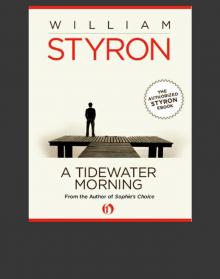 A Tidewater Morning
A Tidewater Morning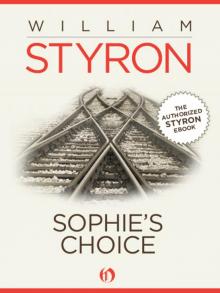 Sophie's Choice
Sophie's Choice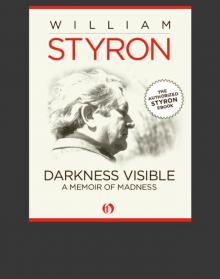 Darkness Visible: A Memoir of Madness
Darkness Visible: A Memoir of Madness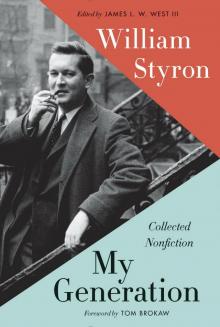 My Generation: Collected Nonfiction
My Generation: Collected Nonfiction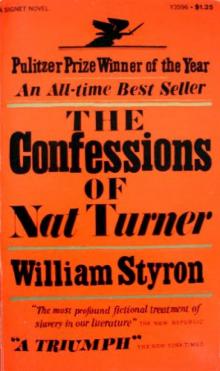 The Confessions of Nat Turner
The Confessions of Nat Turner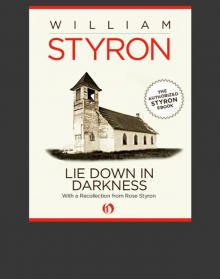 Lie Down in Darkness
Lie Down in Darkness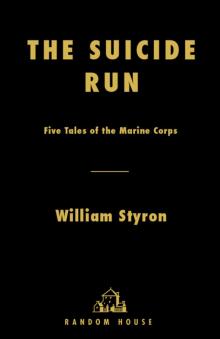 The Suicide Run: Five Tales of the Marine Corps
The Suicide Run: Five Tales of the Marine Corps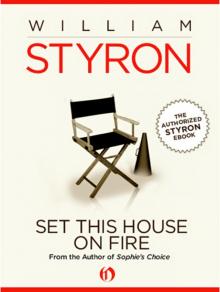 Set This House on Fire
Set This House on Fire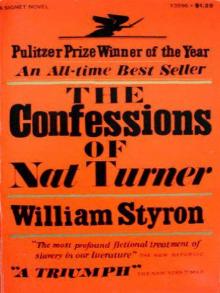 Confessions of Nat Turner
Confessions of Nat Turner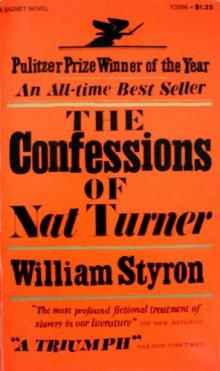 The Confessions of Nat Turner (1968 Pulitzer Prize)
The Confessions of Nat Turner (1968 Pulitzer Prize)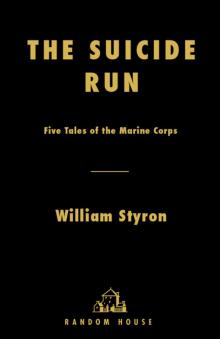 The Suicide Run
The Suicide Run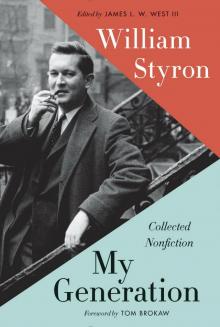 My Generation
My Generation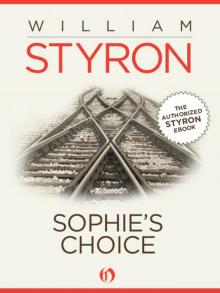 Sophie's Choice (Open Road)
Sophie's Choice (Open Road)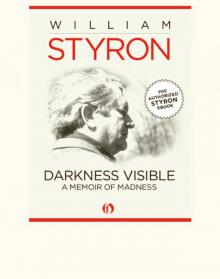 Darkness Visible
Darkness Visible